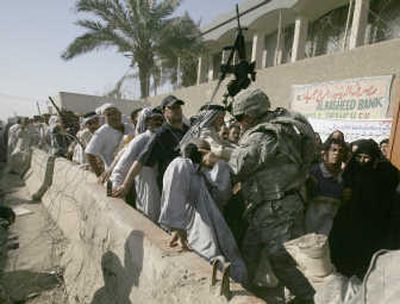Iraq security talks face resistance

BAGHDAD – A proposed U.S.-Iraqi security agreement that would set the conditions for a defense alliance and long-term U.S. troop presence appears increasingly in trouble, facing growing resistance from the Iraqi government, bipartisan opposition in Congress and strong questioning from Democratic presidential candidate Barack Obama.
President Bush is trying to finish the agreement before he leaves office, and senior U.S. officials insist publicly that the negotiations can be completed by a July 31 target date.
But that seems increasingly doubtful, and in Baghdad and Washington there is growing speculation that a United Nations mandate for U.S.-led military operations in Iraq may have to be renewed after it expires at the end of 2008.
On Capitol Hill, top Democrats and Republicans complain that Bush is rushing the negotiations to try to tie his successor’s hands.
Six senators, including the chairmen of the Armed Services and Foreign Relations committees and their ranking minority members, have written Secretary of State Condoleezza Rice in the past week asking for transparency in the negotiations and more briefings. White House, State Department and Pentagon officials briefed lawmakers and staff members on the talks Tuesday.
“There’s a tremendous amount of concern up here about the state of these negotiations. … It’s been expressed repeatedly,” said a senior congressional staffer, who requested anonymity. He noted that there appeared to be growing talk in Iraq of simply extending the U.N. mandate.
A spokesman for Obama, D-Ill., said any long-term U.S. security commitment to Iraq must be subject to congressional approval; alternatively the administration should seek an extension of the current UN mandate. Obama wants a new administration to make it “absolutely clear that the United States will not maintain permanent bases in Iraq,” said spokesman Bill Burton.
Some Iraqi parliamentarians are now saying that Iraq has a third option besides extending the U.N. mandate or agreeing to the proposed Status of Forces Agreement: telling the Americans to go home.
“By December Iraq has to decide what to do,” said Sami al-Askari, a Shiite lawmaker who is close to Prime Minister Nouri al-Maliki. “If we are put in a corner … we have three options, not just two.” Al-Askari said the U.S. side is “keen to sign it early” but has to be “realistic and deal with the issues that are very sensitive for the Iraqis.”
On Tuesday, Ambassador David Satterfield, Rice’s top adviser on Iraq, told reporters in Baghdad that both the Iraqis and Americans were on track to agree and that the U.S. was respecting Iraq’s sovereignty during negotiations.
“We’re confident it can be achieved, and by the end of July deadline,” Satterfield said. “It’s doable, that’s where our focus is, not on alternatives … We’re focused on plan A because we believe plan A can succeed.”
He spoke less than 24 hours after an unnamed senior U.S. official told the Associated Press that the deal may not be completed before Bush leaves office next January. Satterfield bristled when questioned about the “unnamed official” and insisted that the talks were on track for completion July 31.
Iraqi lawmakers say the Bush administration is demanding concessions that are unacceptable, among them: dozens of semi-permanent bases from which U.S. forces can launch missions with no prior consent from Iraq’s government; complete immunity for U.S. troops and security contractors; control of Iraq’s airspace; and no guarantees the United States will defend Iraq against a foreign attack.
The United States has portrayed opposition to the agreement as limited to Iranian officials and followers of radical Shiite cleric Muqtada al-Sadr, who opposes the U.S. occupation. But the chorus of rejection is growing.